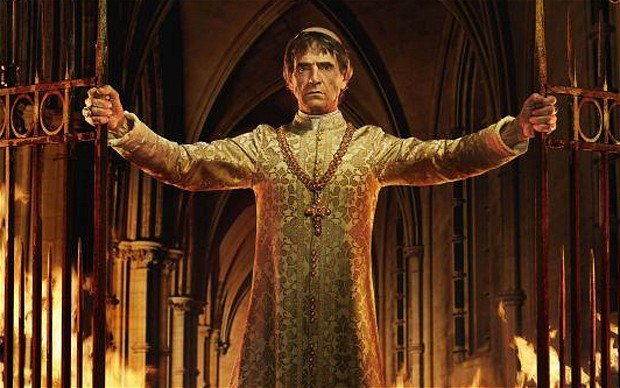Borgias got a bad press, book claims
A new book that draws on documents in the Vatican Secret Archive tries to debunk some of the darkest stories about the much-maligned Borgias

They have become a byword for incest, corruption and decadence, the subject of dozens of books, plays, films and an acclaimed television series.
But a new book that draws on documents in the Vatican Secret Archive tries to debunk some of the darkest stories about the Borgias and to rehabilitate their much-maligned reputation.
Jeremy Irons stars as Rodrigo Borgia in The Borgias
In The Borgias: The Black Legend, Mario Dal Bello, an Italian historian and journalist, argues that the notorious Renaissance clan were the unfair victims of disinformation and propaganda fuelled by the rivalry of other power hungry families.
"The films and miniseries are great fun because they are full of sex, scandal and blood," said Mr Dal Bello. "But they do not represent history accurately.
"The Borgias got a very bad press because the first people to write their history were their critics."
Documents hidden away in the Vatican archives shed new light on the family, he said. Two Borgias become popes – first Alfonso, who took the name Calixtus III when he was elected in 1455, and later Rodrigo, who became Alexander VI in 1492.
He is played by Jeremy Irons in the popular TV series, The Borgias – The Original Crime Family.
The Borgias were loathed in Rome not just for their success in carving out a powerful papal dynasty, but because they were foreigners, hailing from Aragon in modern-day Spain.
"Rome was hostage to the rivalry between the great noble families who were fighting for power and the papacy," said Mr Dal Bello.
"Such was the hatred for the Borgias on the part of the Roman nobility, that on the announcement of the death of the first Borgia pope, Callisto III in 1458, more than 200 people were murdered in a few hours."
The new book tries to separate fact from fiction, particularly in regard to Pope Alexander VI and his eldest son, Cesare.
One of the most notorious claims is that Cesare murdered a servant who was the lover of his sister, Lucretia, in front of their father, the Pope. This story, like many others surrounding the family, is unreliable, said the historian.
"The story was recounted by the Venetian ambassador to Rome but La Serenissima [as the independent Venetian republic was known] was an enemy of Alexander."
Lucretia Borgia has also been the victim of five centuries of misinformation, said Mr Dal Bello. She is portrayed as a scheming vamp who indulged in incest and intrigue at court.
In reality she was "an exemplary wife" who later devoted herself to helping the poor in the city of Ferrara.
"When Lucretia died at the age of 39 in 1519, as a result of the birth of her eighth child, the whole of Ferrara mourned," said Mr Dal Bello. "Even her third husband, who had married her for political reasons, was destroyed. Her last words were 'I'm forever a servant of God'." Much of the black propaganda about her was spread by her first husband, Giovanni Sforza, who was left embittered after Alexander VI engineered the dissolution of his marriage to Lucretia.
The Borgias may have used poison to dispose of their enemies, but so did every powerful family at the time, Mr Dal Bello writes in his book.
Nor was it unusual for popes of the time to have wives and mistresses, as Pope Alexander did – he fathered eight children by at least three women.
Alexander VI may have used unsavoury and ruthless means to grab the papacy but he was also an astute diplomat and an energetic reformer of the Church. The notoriety of the Borgias persists to this day, not just in popular representations but within the Vatican, which has been convulsed by recent years in banking and paedophile sex scandals every bit as sordid as anything from earlier centuries.
Timothy Dolan, the Archbishop of New York, was asked during a television debate in October: "How do we defend the Church with stories such as that involving Pope Alexander VI, who had a lover?" He replied: "Not just one lover, he had many."
The Borgias continue to cast a long shadow, but the Catholic Church, he said, was prepared to admit the mistakes of the past..
- How Easter Killed My Faith in Atheism
- The meaning of Christmas
- A pluralist Church must cast off defunct Eurocentrism
- Murphy-O'Connor: I don’t feel we’re a nation of unbelievers
- "Never be afraid of tenderness"
- The work of the Holy Spirit
- Pope’s Retreat Master Compares Benedict’s Role to That of Moses
- Viewpoint: Advancing the Roles of Women in the Church
- Ideas that the Faith should be built on
- The Church will be an Olympic winner


 Votes : 0
Votes : 0









